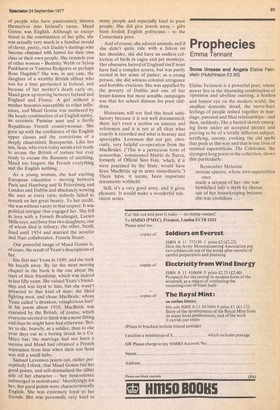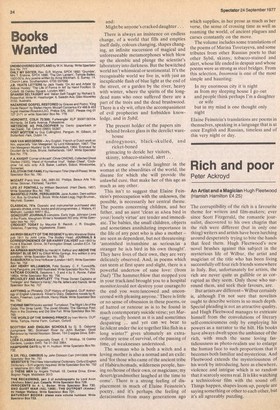Prophecies
Emma Tennant
Some Unease and Angels Elaine Feinstein (Hutchinson £2.95) Elaine Feinstein is a powerful poet, whose power lies in the disarming combination of openness and sibylline cunning, a fearless and honest eye on the modern world, the smallest domestic detail, the nerve-bare feelings of people lashed together in marriage, parental and filial relationships – and then, suddenly, like a buried sketch emerging from under an accepted picture and proving to be of a totally different subject, terrifying, uneasy, evoking the old spells that push us this way and that in our lives of resisted superstitions. The Celebrants, the strongest long poem in the collection, shows this particularly: Rerriember Melusine morose spectre, whose own superstition o made a serpent of her: she was bewitched into a myth by chance out of her housekeeping because she was credulous and: Might be anyone's cracked daughter . . .
There is always an insistence on endless change, of a world that fills and empties itself daily, colours changing, shapes changing, an infinite succession of magical and unforeseeable metamorphoses which blow up the alembic arid plunge the scientist's laboratory into darkness. But the bewitched world isn't whimsical or sentimental. It's the recognisable world we live in, with just an inexplicable flash of blue light at the end of the street, or a garden by the river, heavy with winter, where the spirits of the longdead nuns who once suffered there are a part of the trees and the dead brushwood. There is a sly wit, often the accompaniment of evil prophecies and forbidden knowledge, and in Sybil, The present holder of the papers sits behind broken glass in the derelict warehouse androgynous, black-skulled, and ricket-boned grimacing to deride her visitors, skinny, tobacco-stained, alert. . .
it's the sense of a wild laughter in the woman at the absurdities of the world, the disease for which she will provide the unlawful cure, that make her of this age as much as any other.
This isn't to suggest that Elaine Feinstein's preoccupation with the unknown, the possible, is necessarily her central theme. The poems concerning children, and her father, and an aunt 'clean as a/sea bird in your/ lonely virtue' are tender and immediate. The babies, the small children, objects and sometimes annihilating importance in the life of any poet who is also a mother — are seen as dependent, but not threatening: 'astonished in/sunshine as serious/as a stranger he is/a bird in his own thought'. They have lives of their own, they are very delicately observed. And, in poems which can seem at first spare and slight, there is a powerful undertow of sane love: (from Dad) The hammer/blow that stopped you in your track/and brought you to a hospital monitor/could not destroy your courage/to the end you were /uncowed and unconcerned with pleasing anyone.' There is little or no sense of obsession in these poems, or of hatred or rancour as is to be found in much contemporary suicide verse; yet Marriage, cruelly honest as it is and sometimes despairing ... and yet can we bear to lie/silent under the ice together like/fish in a long winter?' gives ultimately an extraordinary sense of survival, of the passing of time, of weaknesses understood.
The woman who is both a witch and a loving mother is also a nomad and an exile: and 'for those who came of the ancient tribe of Habiru/nomads, wilderness people, having no/house of their own, or magicians; my desert/grandmother laughed at the time to come'. There is a strong feeling of displacement in much of Elaine Feinstein's poetry, and it's perhaps the feeling of deracination from many generations ago which supplies, in her prose as much as-her verse, the sense of crossing time as well as roaming the world, of ancient plagues and curses constantly on the move.
The volume includes some translations of the poems of Marina Tsvetayeva, and some tributes from other Russian poets to that other Sybil, skinny, tobacco-stained and alert, whose life ended in despair and whose poems were as strong as steel bridges. From this selection, Insomnia is one of the most simple and haunting: In my enormous city it is night as from my sleeping house I go out and people think perhaps I'm a daughter or wife but in my mind is one thought only night Elaine Feinstein's translations are poems in themselves, speaking in a language that is at once English and Russian, timeless and of this very night or day.



































 Previous page
Previous page